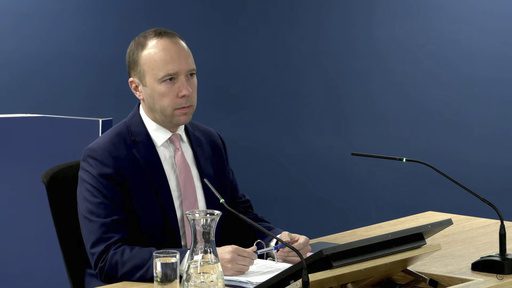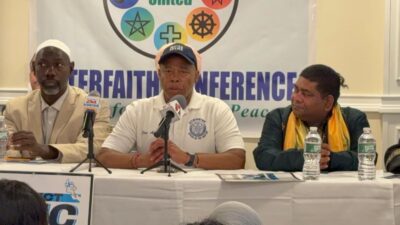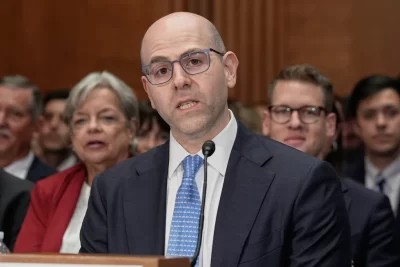
The U.K.’s former health secretary told a COVID-19 inquiry Thursday that the British government would have saved many lives if it had acted sooner and imposed a national lockdown weeks earlier than it did in March 2020.
Matt Hancock, who played a key role in the U.K.’s pandemic response as head of the health department, responded to questions from the inquiry’s lawyer while contesting widespread criticisms about his leadership at a time when the country faced its biggest public health crisis in a century.
Hancock said he had started advocating for a lockdown that required most people to stay home in early March 2020 after speaking with his counterpart in Italy, the first country in Europe to see a cluster of coronavirus cases and the first outside of Asia to restrict people’s movements to curb infections. Italy’s national lockdown took effect on March 10, 2020.
Acting more quickly would have meant that “fewer than a tenth of the number of people would have died in the first wave” of the pandemic, he said.
Hancock resigned as health secretary in June 2021 after apologizing for breaching social distancing rules by kissing a senior aide in an office at the Department of Health a month earlier, 11 days before lockdown rules were eased to allow hugs and other physical contact with people outside one’s own household. Both Hancock and the aide were married to other people at the time.
The former Cabinet secretary, who remains a member of Parliament, said Thursday that he defended the government’s actions at the beginning of the pandemic because the number of confirmed infections in the U.K. at the time was still very low — only 12 reported on March 1, he said — and there was still “enormous uncertainty.”
Almost four years after first COVID-19 cases emerged in China, the independent British inquiry is pouring over WhatsApp messages, phone records and diary entries of key government officials and questioning them to gather information about their political decision-making.
The U.K. had one of the world’s deadliest outbreaks, with around 230,000 coronavirus-related deaths recorded, according to government statistics. Many bereaved families say decisions and actions by politicians at the time contributed to many unnecessary deaths.
A number of officials who gave evidence at the inquiry have accused Hancock of being “overoptimistic” and recalled concerns at the time about poor organization within the health department under him.
The inquiry heard that in one WhatsApp message, Mark Sedwill, the U.K.’s most senior civil servant at the time, joked to Downing Street’s permanent secretary that it was necessary to remove Hancock to “save lives and protect the NHS (National Health Service).”
Helen MacNamara, who served as deputy Cabinet secretary, said in her testimony that Hancock displayed “nuclear levels” of overconfidence and a pattern of reassuring colleagues the pandemic was being dealt with in ways that were not true.
Hancock maintained that he and his department repeatedly tried but failed to “wake up” the central government and warn of the coming crisis early in 2020.
“From the middle of January, we were trying to effectively raise the alarm,” he said. “This wasn’t a problem that couldn’t be addressed only from the health department. Non-pharmaceutical interventions cannot be put in place by a health department. The health department can’t shut schools. It should have been grasped and led from the center of government earlier.”
“We were on occasions blocked and at other times, I would say our concerns were not taken as seriously as they should have been until the very end of February,” he added.
Officials also confirmed Thursday that former prime minister Johnson will give evidence for two days next week in the inquiry.
The former leader is scheduled to make a highly anticipated appearance next Wednesday and Thursday. Current Prime Minister Rishi Sunak, who was Treasury chief during the pandemic, also is expected to give evidence later in December.
The inquiry will not find any individual guilty, but is intended to learn lessons from how the country prepared for and coped with the crisis.




